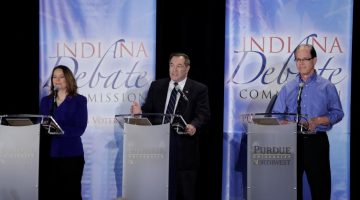After nearly four and half hours of public testimony, the Senate Rules Committee, by a vote of 7-5, moved forward with legislation that would prohibit discrimination based on sexual orientation, however some critics said it did not go far enough to protect religious freedom, while others said it would leave transgendered Hoosier unprotected.
SB 344 adds sexual orientation, active duty military status and veteran status as protected classes in Indiana’s civil rights laws for employment, housing and public accommodations, while also including provisions aimed at protecting Hoosiers’ religious liberty and rights of conscience. The bill would charge a legislative study committee with examining issues related to discrimination based on gender identity.
The legislation also repealed the Religious Freedom Restoration Act.
Despite that, critics say the bill should have included protections for transgendered Hoosiers.
Bill author, Sen. Travis Holdman, said the legislation is a work in progress and protections for the transgendered community could be put back in.
You can hear Holdman’s comments, as well as those from Curt Smith of the Indiana Family Institute as well as Michael Huber of the Indy Chamber in the Leon-Tailored Audio above.
As passed today, SB 344 includes…
- Adds sexual orientation, active duty military status and veteran status as protected classes in Indiana’s civil rights laws for employment, housing, and public accommodations.
- Calls for a legislative study committee to examine the topic of discrimination based on gender identity.
- Provides exemptions to the sexual orientation provisions for clergy, religious organizations, and small businesses of five or fewer employees engaged in marriage-related activities (same as current employer exemption in Indiana civil rights law).
- Replaces Indiana’s RFRA law by codifying the existing “material burden” standard of judicial review established by the Indiana Supreme Court for claims involving Hoosiers’ state constitutional rights to freedom of speech, thought, conscience, religion, the press, and assembly. This would return Indiana to the same legal standard for these core constitutional rights that existed before RFRA was enacted last year.
- Prohibits government entities from taking discriminatory action against clergy or religious organizations based on actions taken in accordance with their religious beliefs regarding marriage.
- Mirrors federal law in allowing religious-affiliated state contractors to limit their hiring to people who follow the organization’s teachings.
- Prohibits government entities from denying any license, including a marriage license, to a person based on their lawful activities related to marriage or sexual orientation.
- Maintains all local civil rights ordinances as they existed on Dec. 31, 2015. Prohibits new local ordinances from differing with state law regarding what classes are covered and what penalties can be levied.
SB 100, which included protections for trangendered Hoosiers died in committee.
Senate Democratic Leader Tim Lanane issued the following statement…
- “Last year, the Republican-inflicted fight over RFRA resulted in great damage and exposed enormous deficiencies in Indiana’s Civil Rights protections. In large areas of our state, it’s legal for LGBT Hoosiers to be married on Saturday and fired for it Monday. Since then, Hoosiers have called on lawmakers to send a strong signal, to make very clear that Indiana does not condone discrimination. Tonight, Republican leadership failed that task spectacularly. They took a step backwards and passed a bill that seemingly overcomplicates what is a very simple question: does Indiana permit discrimination or doesn’t it? Almost equal rights. Allowing “a little bit” of discrimination – as under SB 344 – won’t cut it. RFRA cost Indianapolis $60 million in lost economic activity alone. It cost our state much more. It cost Indiana our reputation as a welcoming state. This really is simple. Equal protection under the law. For all Hoosiers. Nothing more and nothing less. It’s really that easy. These are our neighbors, our friends, Hoosiers. They deserve equal protection. No one should lose their job for who they are. We must protect all Hoosiers equally under the law. Until then, the job isn’t done.”
The measure will likely be heard by the full Senate on Tuesday where lawmakers will be able offer further amendments.













